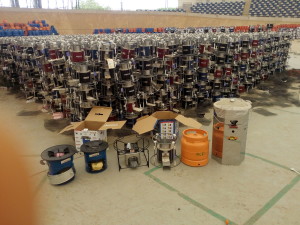In a significant development in the carbon credit industry, the United States Department of Justice (DOJ) has unsealed charges against two individuals involved in a multi-million-dollar fraud scheme, with potential implications for projects in Zimbabwe.

On October 2, 2024, the DOJ announced charges against Kenneth Newcombe, 77, of Santa Barbara, California, and Tridip Goswami, a resident of India.
The pair are accused of orchestrating fraud within the carbon markets through their company, CQC Impact Investors LLC.
The charges allege that Newcombe, CEO of CQC, and Goswami, Head of CQC’s Carbon & Sustainability Accounting Team, along with others, fraudulently obtained carbon credits worth tens of millions of dollars and secured an investment exceeding $100 million through deceptive practices.
CQC’s involvement in Zimbabwe adds a layer of international concern to the case.
The company’s website touts cookstove projects in the African nation, describing Zimbabwe as “in urgent need of a fuel efficient clean cookstove programme.” CQC claims to have laid groundwork for a 200,000-stove programme in Zimbabwe in 2019, including obtaining government approval and conducting a pilot project.
The fraud allegedly involved manipulating data to exaggerate the success of cookstove projects in reducing carbon emissions.
In one instance, when survey data from projects in Malawi and Zambia showed lower-than-expected emission reductions, the conspirators reportedly agreed to “revise” the results, enlisting an outsider to fill out fraudulent survey forms.
The scheme also allegedly involved misrepresenting the number of operational stoves in CQC’s projects to a carbon credit issuer, referred to as “Issuer-1” in the indictment.
This misrepresentation allowed CQC to claim more Verified Carbon Units (VCUs) than warranted.
The DOJ claims that Newcombe’s aggressive expansion of CQC’s cookstove projects from 2020 led to significant quality issues, including poor installation practices and false claims of stove installations. Instead of addressing these issues, the defendants allegedly conspired to conceal the problems from Issuer-1.
U.S. Attorney, Damian Williams, said: “As alleged, Kenneth Newcombe and Tridip Goswami, among others, engaged in a multi-year scheme to fraudulently obtain carbon credits by using manipulated and misleading data. They then sold those credits to unsuspecting buyers in the multi-billion-dollar global market for carbon credits.
“The alleged actions of the defendants and their co-conspirators risked undermining the integrity of that market, which is an important part of the fight against climate change. Protecting the sanctity and integrity of the financial markets continues to be a cornerstone initiative for this Office, and we will continue to be vigilant in rooting out fraud in the market for carbon credits.”
The alleged fraud extended beyond carbon credits.
Newcombe and others at CQC are accused of deceiving an investor into agreeing to invest up to $250 million in the company, including a personal windfall for Newcombe of over $16 million for his shares.
Both Newcombe and Goswami face multiple charges, including wire fraud conspiracy, wire fraud, commodities fraud conspiracy, and commodities fraud.
Newcombe faces additional charges of securities fraud conspiracy and securities fraud. If convicted, they could face significant prison sentences, with some charges carrying maximum terms of up to 20 years.
In a related development, Jason Steele, 47, of Arlington, Virginia, CQC’s former Chief Operating Officer, has pleaded guilty to wire fraud conspiracy, commodities fraud conspiracy, and securities fraud conspiracy for his role in the scheme.
His sentencing date is pending.
This case highlights growing concerns about the integrity of the voluntary carbon market, which has been seen as a key tool in combating climate change.
It also raises questions about the impact on projects in countries like Zimbabwe, where such initiatives are viewed as crucial for both environmental and economic development.
The Zimbabwe government has been a vocal proponent of Africa’s voluntary carbon credit markets, viewing them as potentially transformative for the continent’s economies.
This fraud case may cast a shadow over such aspirations and potentially impact investor confidence in similar projects across Africa.
As the legal proceedings unfold, the case is likely to draw attention from environmental activists, investors, and policymakers worldwide, potentially leading to calls for stricter oversight and regulation of the voluntary carbon market.
